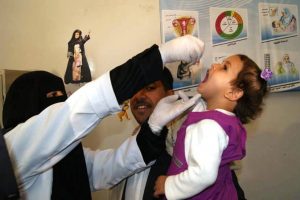Mass polio vaccination campaign to prevent outbreaks

As long as poliovirus continues to circulate anywhere, it threatens children everywhere. Yemen has taken this message on board, ensuring the country’s children are protected against polio by holding a nationwide vaccination round this month. Funding for the campaign included a grant from the Kingdom of Saudi Arabia.
Yemen, which has been polio-free since 2009, is considered to be at high risk of reinfection with poliovirus, as recent instability has led to decreasing access to social and healthcare services, including vaccination for children. Yemen is also threatened by the possible international spread of poliovirus from the Horn of Africa region and continued intense transmission in Chad and northern Nigeria. The country suffered from a severe outbreak of polio in 2005, following the importation of poliovirus of northern Nigerian origin, paralysing 478 Yemeni children.
Heeding the lessons of the past, the country launched National Immunization Days (NIDs) on 14 November at a ceremony hosted by Vice President Abd-Rabbu Mansour Hadi. More than 40,000 health workers were mobilized, aiming to vaccinate more than four million children under five years of age over four days. Prior to the vaccination round, public service message were broadcast on television and radio, posters and banners were widely distributed, and around 3,330 Imams were brought on board to inform Yemeni parents of the importance of vaccinating their children.
While a full analysis of the round is still being compiled, initial reports tell of “unprecedented cooperation and support from communities and local authorities in most part of the country”. By the third day of the campaign, more than 3.7 million children had already been immunized.
In addition to conducting National Immunization Days, countries at risk of polio re-infection, like Yemen, should continue to ensure that their acute flaccid paralysis (AFP) surveillance system is well functioning and able to detect poliovirus importations, and routine immunization coverage is increased.
Yemen is planning to conduct another round of National Immunization Days in early December.



